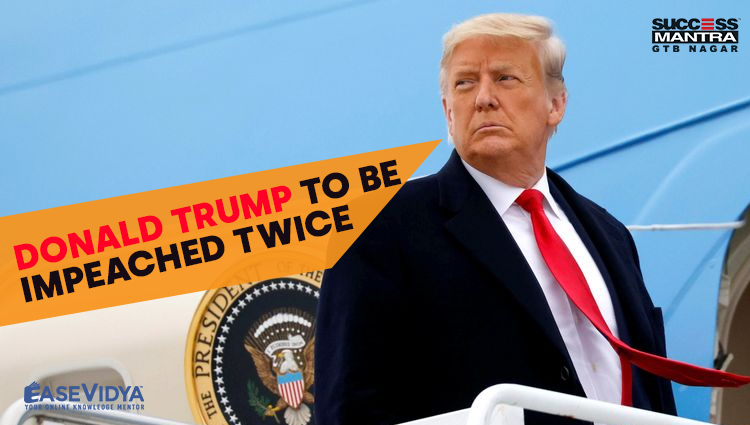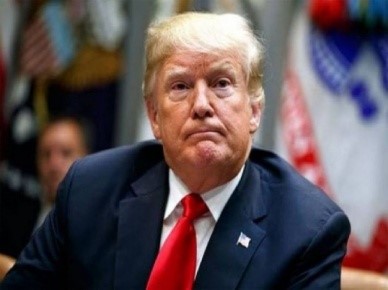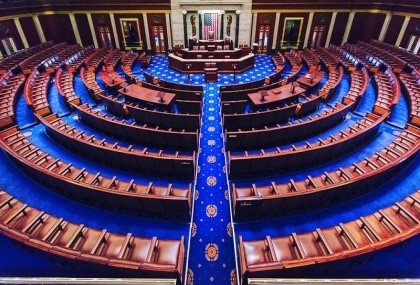
DONALD TRUMP TO BE IMPEACHED TWICE
DONALD TRUMP TO BE IMPEACHED TWICE

US President Donald Trump on January 13, 2021 became the first US President to be impeached twice by the House of Representatives. The House voted to charge him for inciting the mob violence at the US Capitol building on January 6. Trump was impeached by the US House of Representatives with 232 - 197 votes on a single charge of incitement of insurrection at the Capitol, which left five dead. The impeachment motion received support from all Democrats and 10 Republicans, including Liz Cheney, Wyoming lawmaker and the daughter of former Vice President Dick Cheney who condemned and denounced Trump's role in US Capitol riots. With this Trump became the first president in the history of US politics to be impeached twice. He was previously impeached on charges of abuse of power and obstruction of Congress over the Ukraine scandal.
WHAT HAPPENED NEXT?

After securing enough votes to pass the US House of Representatives, the impeachment resolution will now go to the US Senate. The Senate will be required to set up a trial, however, it will not hold it before January 20th, when President-elect Joe Biden will be inaugurated as the next President of the United States. This means that Donald Trump will escape the risk of being removed from office. This doesn't mean that Trump will escape trial, as he will have to face a Senate trial later and if convicted he might be barred in a follow-up vote from seeking the presidency again in 2024. The consensus among scholars is that a “late impeachment” is constitutional. These scholars note that impeachment is used not just to remove officials from office, but also disqualify them from future office. That means there is still a reason to try Trump after he leaves the White House. The Constitution states that one punishment for conviction is “disqualification to hold and enjoy any office of honor, trust or profit under the United States.” Under Senate precedent, only a simple majority of Senate is needed for disqualification. Historically, that vote only happens after a conviction. It’s not clear if someone must be convicted to be disqualified.
REPUBLICANS VOTED IN FAVOUR OF IMPEACHMENT
Ten Republicans broke their party ranks to vote in favour of the impeachment resolution, creating history including party's number three in the House Liz Cheney and John Katko, a ranking member of the House Committee on Homeland Security. Others included Adam Kinzinger, Fred Upton, Jaime Herrera Beutler, Dan Newhouse, Anthony Gonzalez, Peter Meijer, David Valadao and Tom Rice. The lawmakers condemned the role played by the President in inciting the mob, which overwhelmed the police and breached the security at the US Capitol, causing destruction and violence inside the building and trespassing in congressional chambers at a time when electoral college votes were being counted inside the building under the supervision of Vice President Mike Pence. All Congress leaders including the Vice President had to be evacuated to safety.
US PRESIDENTS FORMALLY IMPEACHED
Three US Presidents have been impeached by Congress- Donald Trump, Andrew Johnson and Bill Clinton. Among them, only Trump has been impeached twice in a single term. Besides them, only one other US President has faced formal impeachment inquiries in the US House of Representatives- Richard Nixon. However, no US President has ever been removed from office through impeachment.
BACKGROUND OF THE ISSUE
Donald Trump faced the first impeachment resolution almost a year ago when the Republican-controlled Senate had acquitted him of using his office to try and get information on Biden's family before the election. This time he faced impeachment because of a speech he gave on January 6, in which he claimed that Biden had stolen the presidential election and asked his supporters to march on the Congress to show strength. The mob stormed into the US Capitol building, causing violence and destruction, wrecking furniture and interrupting the counting of Electoral College votes that would confirm Joe Biden's victory and forcing evacuations of lawmakers present inside and Vice President Mike Pence who was presiding over the counting process. The riots fatally wounded one police officer and one protester was shot dead and three other people died of "medical emergencies," bringing the death toll to five.
PROCEDURE OF IMPEACHMENT IN INDIA

When a President is to be impeached for violation of the Constitution; the charge shall be preferred by either House of Parliament.
No such charge shall be preferred unless—
(a) the proposal to prefer such charge is contained in a resolution which has been moved after at least fourteen days' notice in writing signed by not less than one-fourth of the total number of members of the House has been given of their intention to move the resolution, and
(b) such resolution has been passed by a majority of not less than two-thirds of the total membership of the House.
When a charge has been so preferred by either House of Parliament, the other House shall investigate the charge or cause the charge to be investigated and the President shall have the right to appear and to be represented at such investigation.
If as a result of the investigation a resolution is passed by a majority of not less than two-thirds of the total membership of the House by which the charge was investigated or caused to be investigated, declaring that the charge preferred against the President has been sustained, such resolution shall have the effect of removing the President from his office as from the date on which the resolution is so passed.












0 Comment